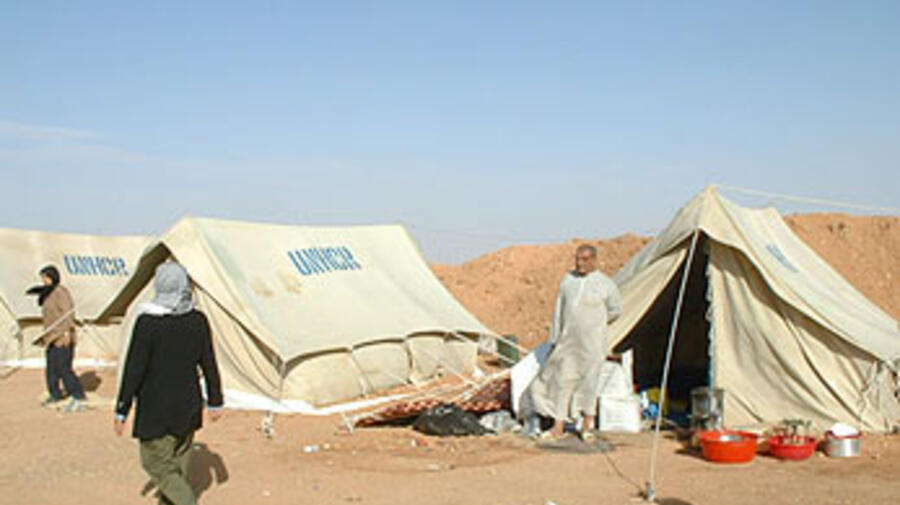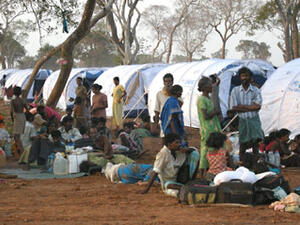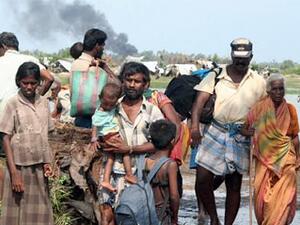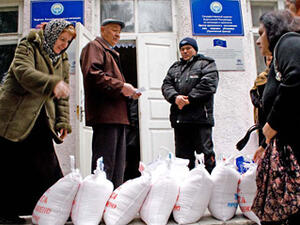UNHCR raises protection concerns on Iraq's borders with Syria, Jordan
UNHCR raises protection concerns on Iraq's borders with Syria, Jordan

UNHCR and the Red Crescent Society have provided tents for people stuck in the no man's land between Iraq and Jordan.
GENEVA, April 22 (UNHCR) - The UN refugee agency today raised concerns about the protection of refugees and asylum seekers along Iraq's borders after Syria deported dozens of Iraqis and Jordan refused entry to hundreds of Iranians fleeing the conflict in Iraq.
On Monday, UNHCR officials in Syria reported that Syrian security forces took 32 Iraqi refugees, including 23 children, out of El Hol camp in north-eastern Syria and moved them to the Iraqi side of the border. A similar incident took place on April 13, when 12 people were removed from the camp and transported back to Iraq. Both groups were residents of the Iraqi city of Tikrit, the hometown and stronghold of Saddam Hussein's regime.
Syrian authorities cited "security concerns" when questioned on the move. While UNHCR acknowledged the host nations' security concerns and the pressure they were under to refuse sanctuary to Saddam loyalists, it stressed that this does not remove legal obligations to give safe haven to asylum seekers and refugees.
"We are aware of the complexity of the situation," said High Commissioner Ruud Lubbers in a statement Tuesday. "But we insist that the basic norms of international refugee law, including exclusion criteria, be observed by all concerned parties."
Under its so-called "exclusion clause", the provisions of the 1951 Refugee Convention do not apply when there are serious reasons for considering that an individual has committed a crime against peace, a war crime or a crime against humanity; has committed a serious non-political crime outside the country of refuge prior to admission; or has been guilty of acts contrary to the purposes and principles of the United Nations.
Syria's El Hol camp currently hosts 168 Iraqi refugees.
Meanwhile in Jordan, the UN refugee agency has reached an agreement with the government to admit Iraqis, Palestinians and Syrians who had been waiting at the border since fleeing Iraq weeks ago. On Tuesday, some 200 people were transported from the Al Karama border crossing to Ruwaished camp in eastern Jordan.
There are reports that the Jordanian authorities have asked the new arrivals at Ruwaished to sign waivers promising to return to Iraq once the crisis is over. UNHCR has maintained that no one should be forced to return to Iraq until security has been re-established in the country.
There are still some 800 people stuck in increasingly difficult conditions in the no man's land between Iraq and Jordan. Most of them are Iranian Kurds who fled central Iraq's Al Tash refugee camp in the last week to escape the chaos and lawlessness that erupted in their communities as Saddam's government collapsed. Before the war, Al Tash sheltered more than 12,000 Iranian Kurdish refugees, many of whom had lived at the camp for two decades.
Fifty-eight other Iranians recognised as refugees by several European and North American countries and Australia also remain in the no man's land, where conditions are primitive and sanitation is poor.
UNHCR and the Red Crescent Society have provided them with tents and a large prefabricated warehouse. In addition, the refugee agency has distributed blankets and other basic assistance, the International Committee of the Red Cross has provided food and stoves, while the Red Crescent Society has distributed clothing, washing soap and other assistance.









